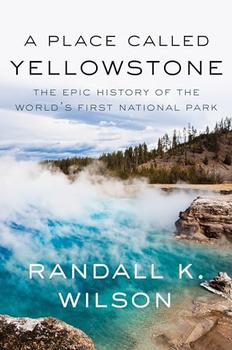
The Epic History of the World's First National Park
by Randall K. Wilson
This epic history of America's first national park explores how a remote Western landscape became an iconic symbol of our country and its vast wilderness so influential to our understanding of the natural world.
It has been called Wonderland, America's Serengeti, the crown jewel of the National Park System, and America's best idea. But how did this faraway landscape evolve into one of the most recognizable places in the world? As the birthplace of the national park system, Yellowstone witnessed the first-ever attempt to protect wildlife, to restore endangered species, and to develop a new industry centered on nature tourism.
Yellowstone remains a national icon, one of the few entities capable of bridging ideological divides in the United States. Yet the park's history is also filled with episodes of conflict and exclusion, setting precedents for Native American land dispossession, land rights disputes, and prolonged tensions between commercialism and environmental conservation. Yellowstone's legacies are both celebratory and problematic. A Place Called Yellowstone tells the comprehensive story of Yellowstone as the story of the nation itself.
"A capably drawn portrait of an iconic American place that remains of world significance." —Kirkus Reviews
"Tensions will always exist between the tourism industry and the conservation movement over Yellowstone's precious resources, but Wilson's account shows an unfolding awareness and sensitivity on both sides to the treasures that lie within those 2.2 million acres." —Booklist
"In this fascinating account of America's most famous landscape, Randall Wilson tells the history of Yellowstone Park and how it relates to the larger story of the American West. In vivid detail, Wilson weaves a compelling tale about a then-revolutionary concept—preserve a spectacular wilderness from commercial exploitation while opening it to the public. A Place Called Yellowstone is a must read for anyone who cares about Americans' relationship to the natural world and the nation's legacy of public lands." —Peter Stark, author of Gallop Toward the Sun: Tecumseh and William Henry Harrison's Struggle for the Destiny of a Nation
"The Yellowstone landscape has stirred everyone who ever set foot there. What Wilson achieves in this book is a fascinating account of how a remote place on the map became something iconic. It's a winding historical adventure—at times exhilarating, at times horrifying—that reveals what makes a place renowned. His tales of this tectonic landscape will move you!" —Christopher J. Preston, author of Tenacious Beasts
"In A Place Called Yellowstone, Randall Wilson addresses a simple question: How did such a geographically isolated park evolve into a national icon that has shaped the way Americans interact with and value nature? His thoughtful, wide-ranging, and engaging answer takes us from the eruption of the Yellowstone Supervolcano 2.1 million years ago to today's first steps toward co-managing Yellowstone by the National Park Service and the Indigenous peoples who know it as a homeland." —Terence Young, author of Heading Out: A History of American Camping
This information about A Place Called Yellowstone was first featured
in "The BookBrowse Review" - BookBrowse's membership magazine, and in our weekly "Publishing This Week" newsletter. Publication information is for the USA, and (unless stated otherwise) represents the first print edition. The reviews are necessarily limited to those that were available to us ahead of publication. If you are the publisher or author and feel that they do not properly reflect the range of media opinion now available, send us a message with the mainstream reviews that you would like to see added.
Any "Author Information" displayed below reflects the author's biography at the time this particular book was published.
Randall K. Wilson, PhD, is a professor of environmental studies at Gettysburg College, where he teaches courses on environmental policy, natural resource management, sustainable communities, and the geography of the American West. He has served on the USDA Forest Service's National Science Panel and on the board of directors for the Rural Geography Specialty Group within the Association of American Geographers. He earned a Fulbright Fellowship to the University of Vienna. His book America's Public Lands: From Yellowstone to Smokey Bear and Beyond was named an Outstanding Academic Title from Choice Reviews and won John Brinckerhoff Jackson Prize from the Association of American Geographers.
Your guide toexceptional books
BookBrowse seeks out and recommends the best in contemporary fiction and nonfiction—books that not only engage and entertain but also deepen our understanding of ourselves and the world around us.